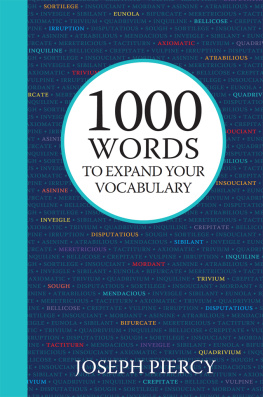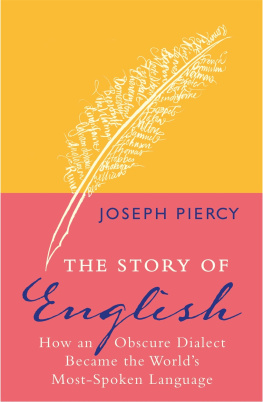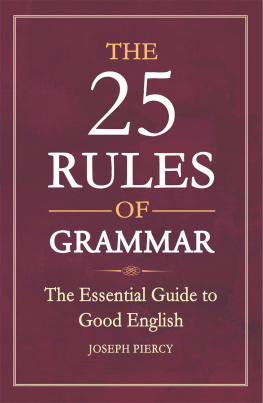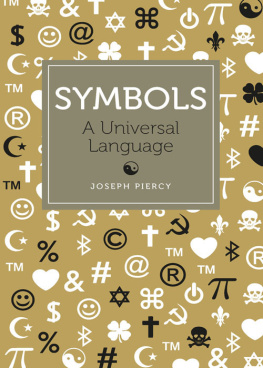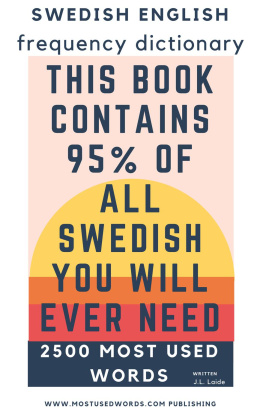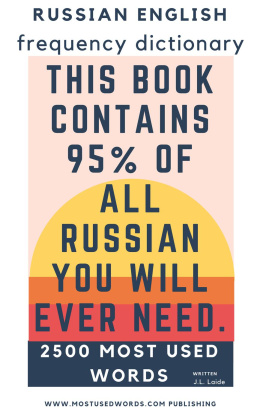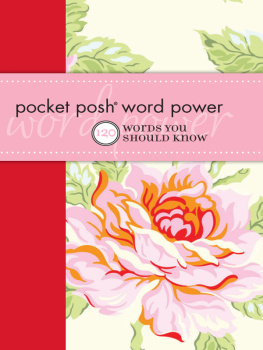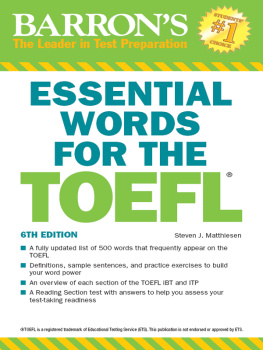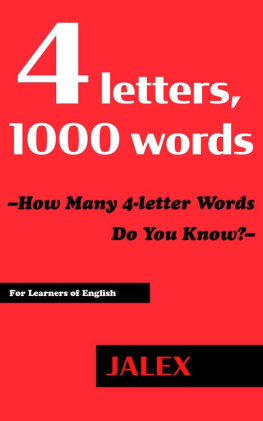By the same author:
The Story of English
Symbols
The 25 Rules of Grammar
First published in Great Britain in 2018
by Michael OMara Books Limited
9 Lion Yard
Tremadoc Road
London SW4 7NQ
Copyright Michael OMara Books Limited 2018
All rights reserved. You may not copy, store, distribute, transmit, reproduce or otherwise make available this publication (or any part of it) in any form, or by any means (electronic, digital, optical, mechanical, photocopying, recording or otherwise), without the prior written permission of the publisher. Any person who does any unauthorized act in relation to this publication may be liable to criminal prosecution and civil claims for damages.
A CIP catalogue record for this book is available from the British Library.
ISBN: 978-1-78243-891-5 in hardback print format
ISBN: 978-1-78243-899-1 in ebook format
www.mombooks.com
Contents


W hen I was young, really young, my parents were worried there was something wrong with me because I didnt speak very much. When I did speak I was afflicted with an overt stammer. The words I wanted to say just couldnt be spoken quickly enough, the thoughts that I had couldnt be expressed exactly, or nearly exactly, how I wanted them to be. In short, I didnt have the words to say what I wanted to say. Hence, I fell silent, withdrew into an internal world, until I learned to read and discovered more words and ways to hide my stutter.
Ive been involved in the meaning of language (and the language of meaning) for well over half my life. In order for a language to function it needs two components: a vocabulary and a grammatical structure. Grammar is sexy in my opinion, a puzzle and a trick, smoke and mirrors maybe? Vocabulary is far more mundane, possibly? After all, it is only words? Right? Wrong!
The beautiful thing about the English language is that it is the most expressive and descriptive language in the world. English absorbs words, like a giant sponge; words from all different cultures that it chews up, swallows and spews out again in different forms; its a Leviathan, the Kraken, a ravenous Hydra basically its a monster, but a beguilingly beautiful beast.
So how do you choose a thousand words from this linguistic maelstrom? Well, I hold my hands up and confess my decisions were partly based on words I like, partly on words I had no idea what they meant and partly on words I thought sounded cool and interesting. There are thousands more out there swimming around in the whirlpool waiting to be hooked out, so please dont take this as an exhaustive list by any means.
It has been an interesting journey. There are lots of words in this book which I have been using erroneously, mordant being one of many. Equally fascinating are the peculiarities of common speech: I locked myself out of my house last week but happily my neighbour has a spare key. Actually, my neighbour did not appreciate being woken up at 3 a.m. to give me the spare key at all and so didnt happily let me get into my house. Haply (fortuitously/luckily) my neighbour has a spare key to my house, but who would notice the difference? But there is a difference in meaning and that is important. Ambiguity is the enemy of truth and meaning and therefore, rather worryingly, general understanding.
Its a slight point, maybe, but worth considering nonetheless. Increasingly, we live in a world of fake news and the post-truth epoch, and thus the necessity to express what we really want to say is of paramount importance; to speak, write and communicate as clearly, concisely and correctly as we can. And for that we need the right words. It is to be hoped this little book may help in some small way.
Joseph Piercy

Aberrant: If something is aberrant it is deviating in some fashion or manner from the norm. Aberrant is a direct borrow from the Latin word aberrns, meaning to go astray. A secondary meaning relates to behaviour, specifically bad behaviour or behaviour considered out of character or abnormal.
Such aberrant behaviour will not be tolerated.

Abet: To encourage or assist another in the fulfilment of an action or (often illegal) activity.
She was charged by the police with aiding and abetting a bank robbery.

Abeyance: In English the word abeyance can be used in technical legal language and in a more generalized manner. Disputes over the contents of a will, for example, may cause a property or title to be placed in abeyance, meaning waiting to be claimed by a rightful heir or owner. Future plans can also be in abeyance if they are dependent upon the outcome of a change in future circumstances.
We had to put our plans for a camping trip in abeyance due to a sudden change in the weather forecast.

Abjure: To abjure is to reject, renounce or forswear a belief, practice or opinion. The word shares the same Latin root jurare, meaning to swear an oath, as perjury and jury and hence has its groundings in law. It is possible of course to casually abjure any formerly held belief or opinion, but in the Middle Ages if the Spanish Inquisition demanded someone abjure from ungodly practices or beliefs it usually meant being tortured or burned at the stake. Not to be confused with adjure (see ).
He abjured his devotion to soccer when it became so expensive to attend matches.

Abnegate: A verb that shares its Latin roots with several other words, all of them in denial. Negare means to deny or refute and the word abnegation began to appear in English as early as the fourteenth century. It was, however, several hundred years before abnegate appeared as a verb. This is an example of retroactive word formation, as it is natural to assume that the act of denying occurred before anyone was accused of being in denial. Abnegate can also be used in a formal sense to refer to the relinquishing of power or responsibility.
President Obama rushed several bills through Congress before protocol decreed he abnegate his presidential powers.

Abrogate: A potential malapropism with the previous entry, as in some senses abnegate and abrogate are very similar. To abrogate is to take authoritative action to abolish or annul something, whereas to abnegate is to give away authoritative power. Where it all gets a bit murky is when it comes to abnegating or abrogating moral responsibility for actions, but that is a matter for subjective judgement.
The incursions by rebel forces had forced the government to abrogate the fragile peace treaty.

Abscond: A borrowing from the Latin word abscondere, meaning to conceal or hide. People usually abscond in a hurry; typically to avoid detection of or an arrest for an unlawful action such as theft.
Next page
